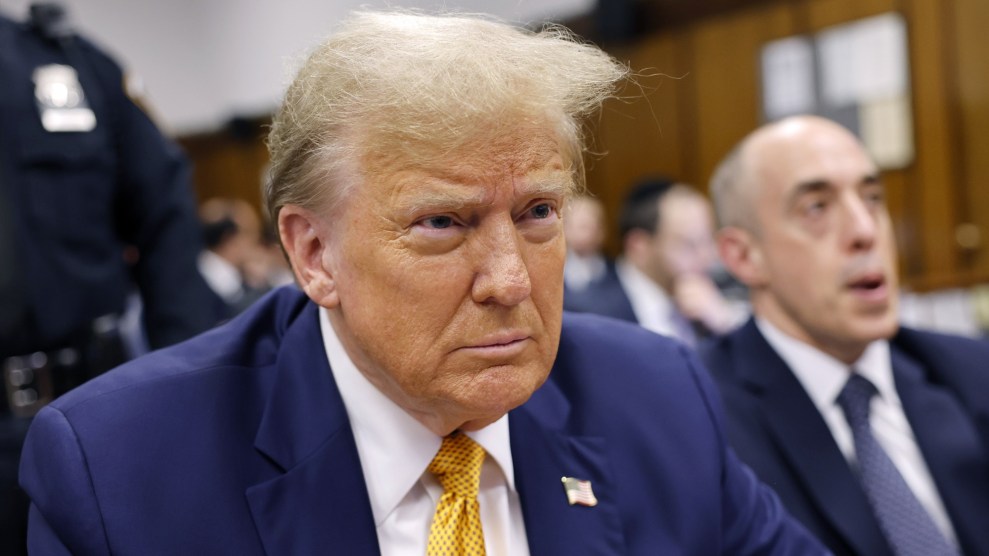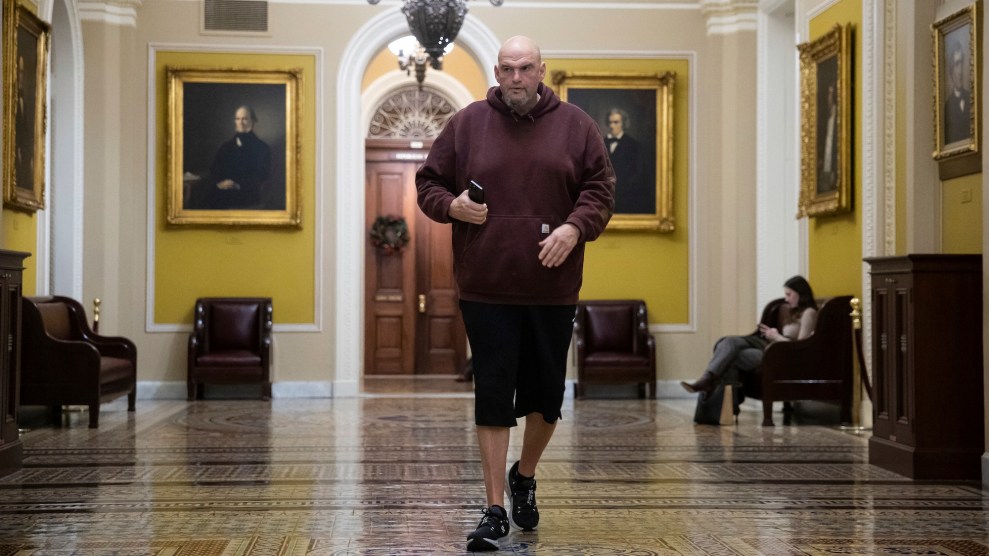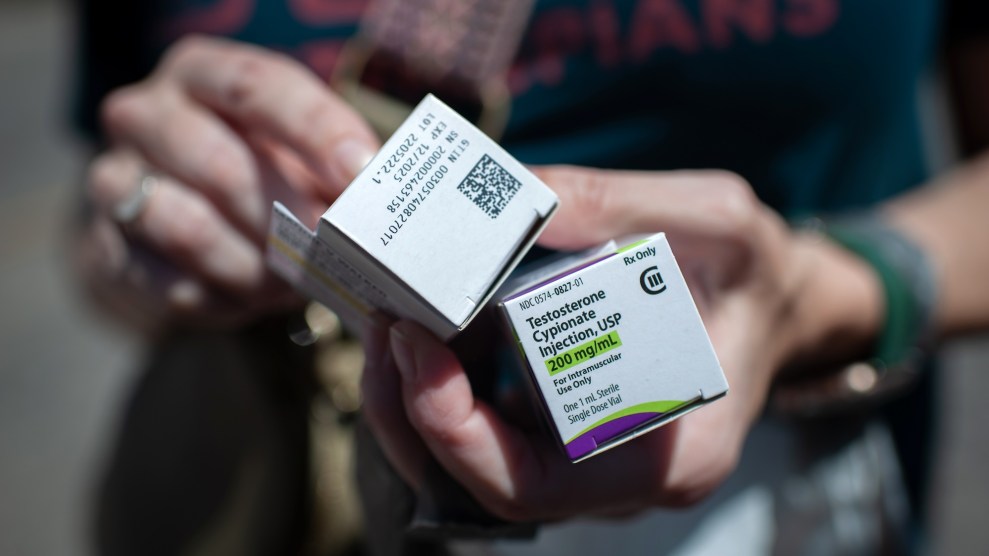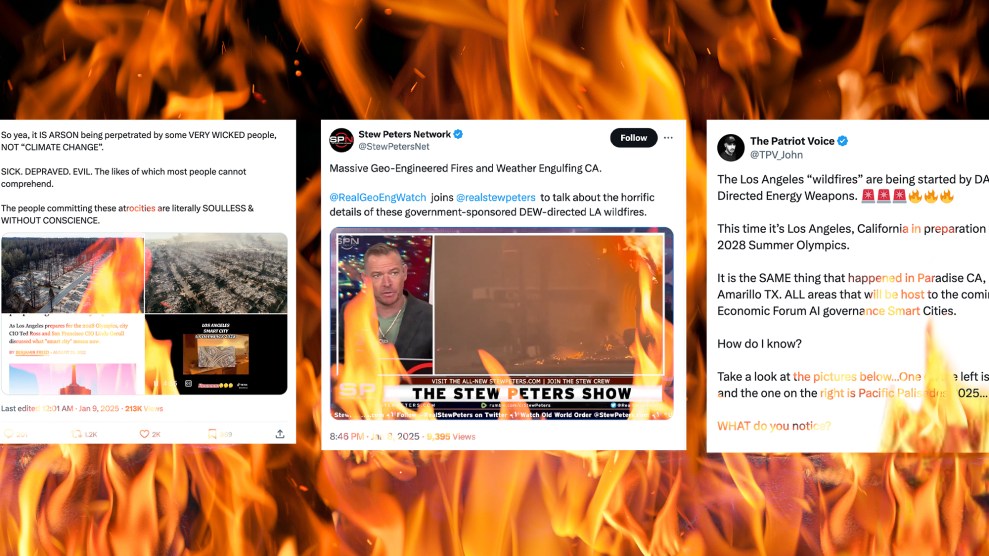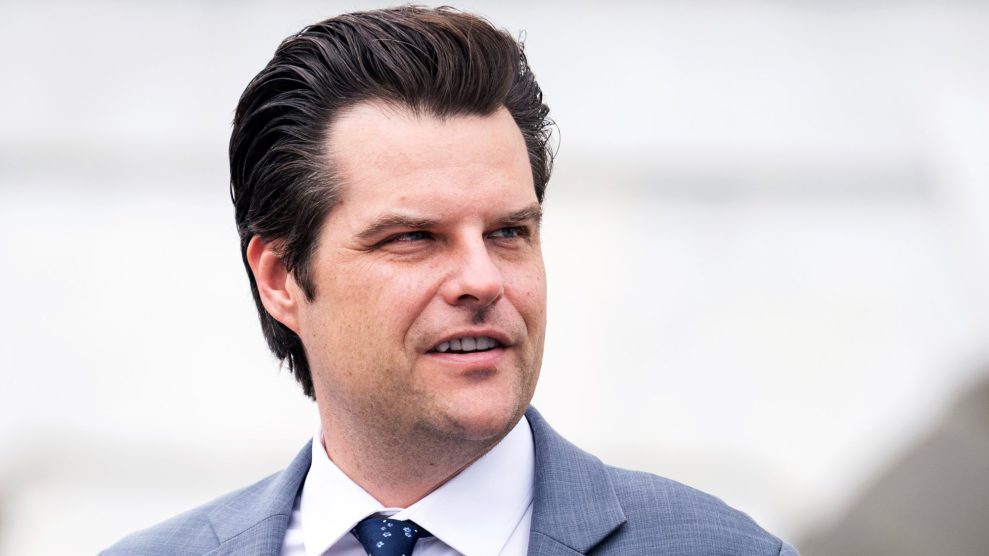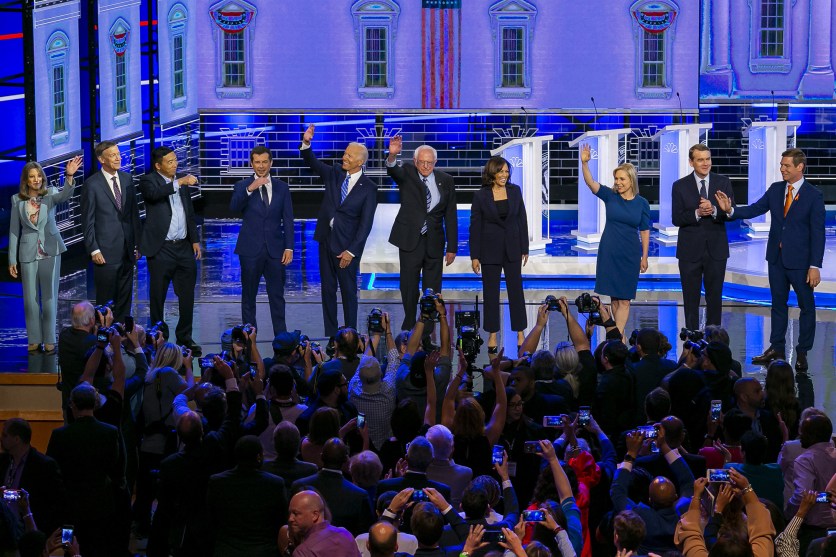
Democratic presidential candidates arrive to the stage at the Adrienne Arsht Center for the Performing Arts in Miami on Thursday, June 27, 2019, for Day 2 of the first Democratic presidential primary debates. TNS via ZUMA Wire
Kay Rollins is good at arguing off the cuff. She is a top high school debater in extemporaneous speaking (commonly called “extemp”), in which students are given a question and 30 minutes to prepare an answer, after which they have to rattle off a seven-minute speech. She’s headed into her junior year of high school in McLean, Va.
Rollins took a break from coaching younger students on Friday to talk to Mother Jones. We discussed her impressions of the first two Democratic debates, the logos and pathos of Kamala Harris, Elizabeth Warren’s “quintessential” debate moment, and what Marianne Williamson would be like in a speech and debate competition.
What stood out to you about the first debate?
So, the No. 1 rule in debate is to always answer the question—so much so that I actually once had a camp counselor who had that tattooed on her arm. And no one did a very good job of answering the question at any point. I think that, in particular, this stood out with [Tulsi] Gabbard’s first response. She was asked about the wage gap. And she found a way to relate the wage gap to 9/11—in less than two sentences!
If someone did that during extemp debate, how would that go? How would that score?
Well, I once watched someone relate the Boeing 737 crash to 9/11.
Oh my gosh.
And I saw jaws in the room open by the time he said the actual word “9/11.” Like—we already knew where he was going. But people were just astonished. Because not only did this show sort of a lack of decorum, but also just a complete lack of topicality. You can’t even think of something related to your question more than one of the great American tragedies?
So, when you saw a presidential candidate do what you saw one of the worst debaters do, were you surprised?
Honestly, I’m not surprised. I’m just disappointed. Like a parent given a really bad gift. The thing is very few people, in very few moments, answered things directly. There was always this roundabout way of speaking they all did—maybe they’d say the answer 30 seconds into their 45-second spot. But if I was judging this like a debate tournament, already I have Gabbard in the lower half of the room.
Wow. Okay. So I think that’s actually an interesting way of thinking about this. If you were a judge, give me a few highlights and lowlights of the first debate.
The way I see it, it’s divided into people who talk about policy and people who don’t. There’s a concept in the debate called solvency. It’s like whether or not you solve for the issues in your speech—pretty self-explanatory. And it’s particularly important when there are solution-based question like: How are you going to fix income inequality? What are you going to do about health insurance? What do are you going to do about immigration? The people with actual policies were really strong on solvency. So, I think the highlights were Warren’s immediate answer on health insurance—where she just went straight to Bernie Sanders’ bill. Because that’s already a policy that’s out there. People can can point to it and test the ground for a more substantive conversation. Booker on immigration had like a three-point plan; Castro talked about a specific amendment to a bill. I think Warren and Castro did a good job of incorporating policies throughout—a lot more than people like Gabbard did. I mean, Tim Ryan was just, he was just a little all over the place. But that’s just Tim Ryan, you know?
In extemp you’re rewarded for memorizing policy or memorizing, let’s say, an economist’s theory, and then applying it to a situation, right?
Yeah, and sources and stuff.
But in their situation, what they often memorize are these anecdotes of, like, “I met a boy in Oklahoma.” What would happen in an extemp round, if you started telling an anecdotal story like that?
I coach a couple of novices at my school. And one of them last year, she gave a speech to me. She starts off with the sentence, “When I was a little girl…”
And I cut her off right there.
I’m like: “No. Go re-prep that.”
She was like: “Why? It’s a personal narrative. It’s great. It’s humanizing.”
I’m like, “No.”
Because in extemp, you don’t use personal narrative. You can use “narrative” narrative—people talking about, like, the terrible thing that happened to that father and his daughter immediately before the Democratic debate, where they died crossing the river. That’s something you can talk about, as long as you’re not framing it as exploiting the tragedy, as long as you’re framing it as, this is why we have to look at the policy question. But, no, never use a personal story. Because what are the odds that’s actually true?
So is the idea that also there’s a concern in debate with mythmaking and false claims?
Yeah, absolutely. I’ve seen people sometimes lie about trauma in rounds. For example, this is at one of my first tournaments. I’m in middle school; I’m like a scared little eighth grader. One student told the audience that he had tried to commit suicide prior. I come up to him afterward, I’m like: “That’s so brave.” He’s a senior. He goes: “Oh, no, no, no—that never happened. I just had to say something.”
Oh my gosh. Well, I’m sure that happens all the time in presidential candidates too, to a lesser extent, where there are these tweaks to their personal narratives that suddenly get bigger and get caught later on down the line.
All of these stories—they serve a purpose. As much as I’m not in favor of personal narrative in debate, in a presidential debate situation it’s a given. This is where it definitely differentiates between extemp and what we’re doing in the Democratic debate. There’s a difference between trying to let someone know the candidate and trying to let someone know you as a speaker. I’m not trying to convince the judge I’m the nicest person in the round; I’m trying to convince them I have the best speech. The candidates aren’t focused on policy. They’re focused on proving they’re the best person for president.
Let’s go to the second debate, then, because that leads into my next question: Did people do things different—in terms of tone, pausing, style—than in [competitive] debate to be likable?
Well, so [Andrew] Yang was actually the one that reminds me the most of a very by-the-book debater.
Interesting.
Because he just started rattling off numbers.
[Editor’s note: In speech and debate events, the speech side is more poetic and focused on performance, while the debate half is more focused on technocratic breakdowns of a given topic.]
And that’s what debaters do?
Yeah, like, I just listened to a middle schooler tell me that a 1 percent increase in per capita GDP leads to a 1.7 percent decrease in poverty. Like a 10-year-old telling me this. And so Andrew Yang talking about the value-added tax, how much much money the country would make if mentally healthier, like the $700 billion and $800 billion numbers. That felt most like what I might see in a debate round.
Harris did well on speech. In events like extemp, you need logos and pathos—like the Greek things. And it’s taught at every speech and debate institute. It’s taught in classrooms. You need logic and emotional appeal. And in every single answer to the questions, she had both—and particularly on jobs. She would go with a logical appeal matched by a policy proposal and then immediately go to a story. She was clearly coached into that. Some of the stories seemed canned. But they were delivered with enough genuine emotions that I kind of believed it.
[Bernie] Sanders stood out too. He was just yelling the whole time.
[Joe] Biden, from a speech and debate perspective: Oh my. He was simultaneously arrogant and passive. And that’s not a positive combination—for a presidential candidate, for a debater, for anyone.
Hmm. So let’s imagine Marianne Williamson is in an extemp tournament. Just walk me through how that would go, what that would be like.
In extemp, there is a prep room, where you do your 30 minutes of preparation before going to speak. I think Marianne Williamson would be the person who has a crystal on the desk next to her sources for the talk. And then she’d pull out her boxed water. People probably don’t sit directly next to her. When she goes to give her speech, she’d be the type of person to ask the judge all about their day prior to speaking.
Are you not supposed to do that?
You’re supposed to hit the stage, say: “My name is Kay Rollins. I’m code 123. My question today is ‘blank.’ Judges ready?” They nod. And then you start. I feel like she would go in and be like: “Hi. How are you today? Oh my god, I love your jewelry.” Which would be abnormal. And then during her speech I’m pretty sure it would be entirely personal narrative. Like that thing about New Zealand.
Which was so strange.
It had nothing to do with it, but it was there.
Were there any moments that you saw someone using a very typical debate strategy?
I think Harris’ answer on immigration, in the second debate, was the strongest example of “debate” being used. It was three policy positions—which is exactly what you do in extemp, you have three main points. So it was deferral of deportation for DACA parents, citizenship for DACA kids, and then veterans who serve who are undocumented should stay. Then she gets to what she would do as president and then an appeal to emotion based on family-separation policies. I think that was a very clean debate method—kind of argumentatively and with the emotional appeal.
The person who most reminds me of a debater in this entire thing: Warren. Which doesn’t surprise me, because she was a debater.
A good one, right?
She won the Bellaire tournament in Texas, which is a major speech and debate tournament. It’s still going on to this day. It still has prestige.
When the host goes, “Do you have a plan to deal with that?”—talking about Mitch McConnell—and she pauses and she says, “I do,” right? That is a quintessential moment. And it’s similar to cross-examination in debate: Someone asks you a question to trap you, you calm yourself down, you give a very short answer. (Usually the audience laughs or gives you some acknowledgement.) Then you really go into it.
Who are the five most debater-y folks who are in the presidential race?
Warren for her arguments and cross-examination skills. Harris because of her use of merging emotions with policy. Then Andrew Yang, just for spouting off numbers. I’m not going to lie—I knew how he was going to pay for it by the end of it, but it was really boring.
Andrew Yang reminds me of some folks who were very interested in high school debate—really into “pure logic.”
Yeah, like the fact that his face does not move while saying any of this gives me flashbacks to watching public forum debate rounds as a younger student. That kind of answer is why I went into the speech side of speech and debate.
Okay, so we’ve got Yang, Harris, Warren.
I think [Julián] Castro—for his cross-examination of Beto [O’Rourke]. And I think [Pete] Buttigieg was solid from a debate perspective. He has that thing down where he can answer a question really quickly and then pivot to another one. Which is an important tactic because it allows you to focus on what you have stuff ready for.
You didn’t mention John Delaney. I’m just curious about your perspective on him. He doesn’t remind me of a debater. But what he does remind me of is a debate coach—maybe like an older guy, sort of sad and around.
No, he’s neither a debate coach nor a debater.
Really? What is he?
He’s a 40-year-old who has a stable office job, works 9 to 5. And is sort of friends with the debate coach, you know?
Okay, perfect.
And as a result spends every weekend at a tournament reliving his glory days.
And that’s a trope that exists?
There are so many that relive their glory days. Usually they’re younger. But John Delaney just exudes old-man energy. He just wishes things were different. I got a similar vibe from Tim Ryan. They’re just hanging out. They’re there. They want to see what the high school kids are debating. But they mainly wish it was still like when they were kids.
What answers did you like?
I liked [Amy] Klobuchar’s answer on gun control, that “if we get bested by a bunch of 17-year-olds, that’s the best thing that ever happened.” That is what debate culture is: It’s a bunch of high school kids who want to change the world in whatever way. They want to do good things, but they might not know how. And I think that’s the responsibility for presidential candidates—to know how. So I’m excited to see how they plan to change things.
Correction: An earlier version of this story misstated where Kay Rollins goes to high school. It’s in McLean, Va.


